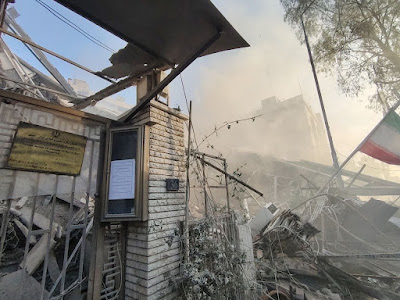6 Days is a 2017 joint British and New Zealand production based on the events of April-May 1980 when six armed gunmen stormed the Iranian Embassy in London and took 26 people hostage. The perpetrators of the takeover were Iranian Arabs from the Khuzestan area of Iran. These Arabs are one of the ethnic groups that make up the country, and have at times sought independence from Tehran. That effort continues today.
The six gunmen traveled to the United Kingdom on Iraqi passports. The weapons they used in the attack on the embassy were brought into the UK in diplomatic shipments to the Iraqi Embassy - the entire operation was planned by the Iraqi Intelligence Service. Iraqi President Saddam Husayn was a supporter of the uprising by the Iranian Arabs – at one point, he wanted to annex Khuzestan to Iraq.
After taking control of the embassy, the gunmen demanded that Iran release 91 Arab prisoners in Iranian custody, and that they be provided safe passage out of the United Kingdom. Iran refused the first demand, and British Prime Minister Margaret Thatcher refused the second – the siege began.
Two teams of the British Army’s elite 22nd Special Air Service (SAS) Regiment were deployed to London and began planning various options to rescue the hostages and either capture or kill the perpetrators.
The movie details each of the six days alternately through
the eyes of BBC reporter Kate Adie, SAS team member Lance Corporal Rusty
Firmin, and Metropolitan Police hostage negotiator Max Vernon.
Vernon played a critical trying to keep the situation from spiraling out of control . Eventually, he was able to secure the release of five hostages. On the sixth day, one of the perpetrators killed the Iranian Embassy chief press officer.
That murder triggered the approval from Mrs. Thatcher for the SAS teams to assault the embassy, attempt to free the hostages, and either capture or kill the perpetrators.
The SAS did just that. They assaulted the building, much of it caught on broadcast media, and succeeded in rescuing 19 of the remaining 20 hostages; one was killed in the attack, and two others were wounded. Five of the perpetrators were killed by the SAS teams, and one was captured. He was sentenced to life in prison, but was paroled in 2008. He was allowed to remain in the UK since neither Iran nor Iraq would take him, and lives in London under an assumed identity.
The assault took 17 minutes.
Let’s take look at the conditions that led these Iranian
Arabs to conduct this attack. In 1979, after the Iranian Islamic revolution had
brought down the Shah, there was an uprising in Khuzestan, fed by demands of
autonomy. The uprising was crushed by Iranian security forces, resulting in
more than a hundred combined casualties from both sides.
Since 1999, the Arab Struggle Movement for the Liberation of Ahwaz (ASMLA), headquartered in Denmark and The Netherlands has advocated for an independent Arab state in Khuzestan, and has committed acts of terrorism and assassinations in support of this goal. The group is allegedly financed and sponsored by Saudi Arabia.
My major issue with the movie: Subtitles claim that the terrorists, nationalists from the ethnic-Arab Khuzestan area around Abadan, are speaking Arabic. Anyone with more than a week’s language training in either Arabic or Farsi will know that this is Farsi, the language of the majority Persians. Khuzestani Iranians mostly speak Arabic as their native language, but of course, also speak Persian. I would have expected them, given the context of the film, to be speaking Arabic. Yes, I know, small knit pick, but it does impact the credibility of the movie.
How close are the two languages? Arabic is a Semitic language, along with Hebrew and Maltese. Farsi is an Indo-European language in the family of Dari. Urdu, Pashto, and Hindi. There are many crossover words in Farsi that appear to be Arabic, but have different meanings – the linguistics scholars call that a “false cognizant” and is enough to get you in trouble if you think you know the actual meaning.
Strong performances by Mark Strong as Max Vernon, Jamie Bell as Rusty Firmin, and Abbie Cornish as Kate Adie. Since this was closely based on actual events, there was almost no suspension of disbelief required to watch and enjoy this presentation.
I recommend it – it moves quickly and can be intense.









